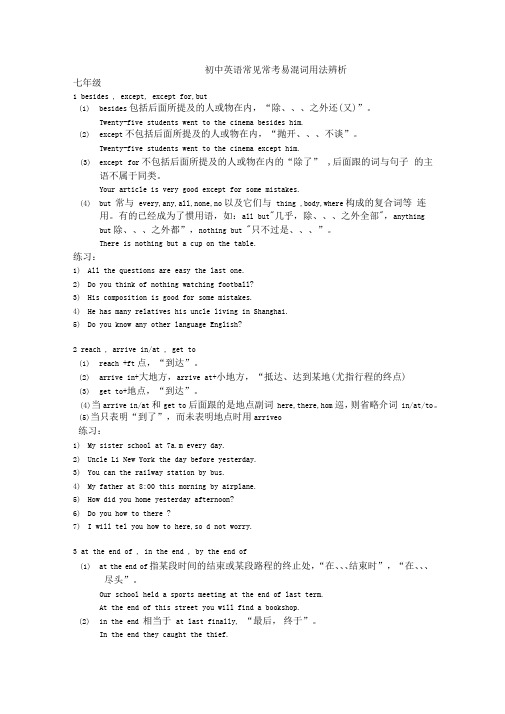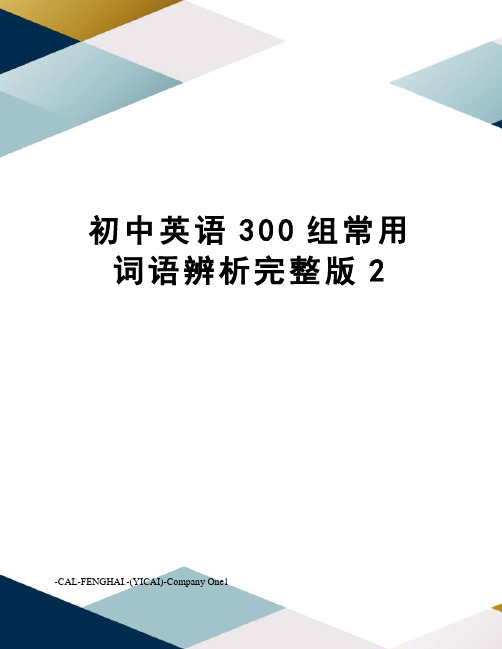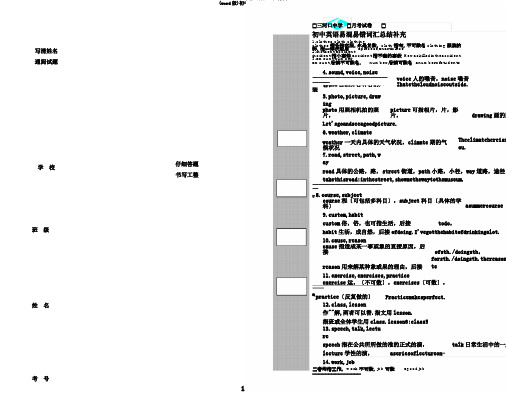(完整word版)初中英语易混词汇辨析.pdf
- 格式:pdf
- 大小:240.85 KB
- 文档页数:4

初中英语常见常考易混词用法辨析七年级1 besides , except, except for,but(1)besides包括后面所提及的人或物在内,“除、、、之外还(又)”。
Twenty-five students went to the cinema besides him.(2)except不包括后面所提及的人或物在内,“抛开、、、不谈”。
Twenty-five students went to the cinema except him.(3)except for不包括后面所提及的人或物在内的“除了” ,后面跟的词与句子的主语不属于同类。
Your article is very good except for some mistakes.(4)but 常与every,any,all,none,no以及它们与thing ,body,where构成的复合词等连用。
有的已经成为了惯用语,如:all but"几乎,除、、、之外全部",anythingbut除、、、之外都”,nothing but "只不过是、、、”。
There is nothing but a cup on the table.练习:1)All the questions are easy the last one.2)Do you think of nothing watching football?3)His composition is good for some mistakes.4)He has many relatives his uncle living in Shanghai.5)Do you know any other language English?2 reach , arrive in/at , get to(1)reach +ft点,“到达”。
(2)arrive in+大地方,arrive at+小地方,“抵达、达到某地(尤指行程的终点)(3)get to+地点,“到达”。

初中英语300组常用词语辨析完整版2 -CAL-FENGHAI.-(YICAI)-Company One1初中英语300组常用词语辨析(2)§78 beach/ bank/ coast/ shoreⅠ. beach “海滨、海滩、湖滩”指高水位与低水位之间的滩地。
如:On the hot sunny summer’s day, on the beach you can feel how hot the sand gets. 在炎热而晴朗的夏天,在滩下会觉得沙子有多烫。
Ⅱ. bank 指河流或湖泊的“岸”或“堤”,如:① He swam to the bank.他游向了岸边。
Ⅲ. coast “海岸、海滨”指海与陆地相接的线,是地理学上的用语。
如:② They sailed along the coast.他们沿海岸航行。
Ⅳ. shore “岸”指海、洋、湖或大河之岸而言,有较强的与水相对的意思。
如:His fisherman went to the shore before daybreak. 渔夫在天亮前就到海岸上去了。
§79 beat/ hit/ strike/ knockⅠ. beat 着重“连续地击打”如殴打或体罚,也指在游戏、竞赛或战争中击败对方。
如:① Don’t beat the child 不要打孩子。
② In the end their enemies were beaten.最后他们把敌人打败了。
③ He beat the world record in high jump. 他打破了跳高世界纪录。
Ⅱ. hit 往往与strike通用,但严格地说,hit指“打中”或“对准……来打”,着重敲打或打击对方的某一点。
如:① The stone hit him on the head. 石头击中了他的头。
② I hit the target. 我击中了目标。
Ⅲ. strike 是很普通的用词,通常表示“打一下、打若干下”等意思,不一定都是有意的。

初中英语词汇辨析1. clothes, cloth, clothingclothes统指各种衣服,谓语动词永远是复数,cloth指布,为不可数名词clothing 服装的总称,指一件衣服用a piece of, an article of2. incident, accidentincident指小事件, accident指不幸的事故He was killed in the accident.3. amount, numberamount后接不可数名词,number后接可数名词a number of students4. family, house, homehome 家,包括住处和家人,house房子,住宅,family家庭成员. My family is a happy one.5. sound, voice, noisesound自然界各种各样的声音,voice人的嗓音,noise噪音I hate the loud noise outside.6. photo, picture, drawingphoto用照相机拍摄的照片,picture可指相片,图片,电影片,drawing画的画Let's go and see a good picture.7. vocabulary, wordvocabulary词汇,一个人拥有的单词量,word具体的单词He has a large vocabulary.8. population, peoplepopulation人口,人数,people具体的人China has a large population.9. weather, climateweather一天内具体的天气状况,climate长期的气候状况The climate here is not good for you.10. road, street, path, wayroad具体的公路,马路,street街道,path小路,小径,way道路,途径take this road; in the street, show me the way to the museum.11. course, subjectcourse课程(可包括多门科目),subject科目(具体的学科)a summer course12. custom, habitcustom传统风俗,习俗,也可指生活习惯,后接to do,habit生活习惯,习惯成自然,后接of doing. I've got the habit of drinking a lot.13. cause, reasoncause 指造成某一事实或现象的直接原因,后接of sth./doing sth,reason用来解释某种现象或结果的理由,后接for sth./doing sth. the reason for being late14. exercise, exercises, practiceexercise运动,锻炼(不可数),exercises练习(可数),practice(反复做的)练习Practice makes perfect.15. class, lesson作"课"解时,两者可以替换.指课文用lesson. 指班级或全体学生用class. lesson 6; class 516. speech, talk, lecturespeech指在公共场所所做的经过准备的较正式的演说,talk日常生活中的一般的谈话,讲话,lecture学术性的演讲,讲课a series of lecture on…17. officer, officialofficer部队的军官,official政府官员an army officer18. work, job二者均指工作。

中考词汇辨析§1 a bit/ a little这两个词都意为“一点儿"有时可以互换,但有时不能.Ⅰ.二者作程度副词修饰形容词、副词、动词或比较级时,意义相同,为“一点儿”“有些”。
如:①I am a bit / a little hungry。
我有点饿。
②He walked a bit / a little slowly. 他走路有点慢。
Ⅱ.二者都可以作名词词组,充当主语或宾语。
如:①A little / bit is enough for me。
我有一点儿就够了。
② I know only a little / a bit about her。
我对她的情况只了解一点。
Ⅲ。
a little可直接修饰名词;a bit后须加of才可以。
如:①.There is a little water in the bottle. = There is a bit of water in the bottle.[注意] a little of后的名词通常特指,表“……中的一些”,如:①May I have a little of your tea?Ⅳ。
否定形式 not a little 作状语,相当于very/ quite,“很”, “非常";作定语和宾语时,相当于much,意为“许多”。
而not a bit 作状语时,相当于not at all, 意为“一点也不”,作宾语时则相当于not much. Eg:①He is not a little (=very) hungry. 他饿极了。
②He is not a bit (=not at all) hungry.他一点也不饿。
③She ate not a little (=much)。
她吃得很多。
Ⅴ. Not a bit中的not 可以分开使用;not a littl e中的not 则不能分开。
Eg:①He felt not a bit tired。

1、slash:砍 slump:暴跌 slash:溅、泼2、insult:侮辱 consult:询问 insulate:隔离 counsel:讨论、劝告 console:安慰3、limit:界限;限制utility:功用ultimate:最后的imitate:模仿 intimate:亲密的 initiate:最初4、fake:假装 fate:命运;注定5、remark:言辞;注意 remain:保持 remind:使想起6、stretch:伸长;拉紧 scratch:抓 strain:扭伤 sketch:素描7、sensible:明智的 sensitive:敏感的8、vanish:消失 vague:含糊的9、defy:不服从 deny:否认;拒绝10、negative:消极的 negotiate:转让;交涉11、inferior:差的 superior:高级的12、humorous:幽默的 humble:卑下的 humid:潮湿的13、emerge:出现 submerge:淹没 merge:合并;使混合14、ignore:忽视 ignite:点燃15、ascribe:归因于 describe:描述 prescribe:规定;开药方16、curve:曲线;弯曲 cue:开端;线索 crue:治愈17、flow:飘扬 flaw:缺点;使破裂18、contest:争论;竞赛 contest:上下文 contend:主张,声称;竞赛 protext:抗议19、instance:以...为例;建议instantly:马上地;立即的 constantly:不断地;时常的consistently:前后一致的20、frantic:疯狂的fraction:小部分21、compatible:兼容的 comparative:比较的 competitive:竞争的;比赛的22、deliver:支付;递送 decline:斜面;衰退disinclined:不情愿的 incline:易于;使倾斜 descend:下降23、casual:临时的;随便的 coarse:粗糙的 cancel:取消 casualty:伤亡 conceal:隐藏reveal:泄露,揭露24、extent:范围,长度 extend:推广 extinct:灭绝的 distincti:清楚地;明显独特的25、furious:激烈的;喧闹的 curious:好奇的26、orign:原点;起源 reign:统治;支配 region:地区 religion:宗教27、heat:高温;热烈 heal:治愈 heap:堆;许多 haul:拉、拽28、insurance:保险 assurance:保证;断言29、commence:开始;着手immense:极广大的30、expel:逐名、驱逐 compel:强迫 ample:足够的;丰富的 comply:答应 repel:逐退;排斥amplify:放大;增强 repeal:撤销31、retreat:撤退retrieve:恢复restrict:限制refrain:强迫 contrieve:谋划 constrain:强迫;束缚32、explicit:外在的;清楚地 exploit :使用;开发 explosive:爆炸 exposure:揭露 expire:期满;断气33、criticism:批评criticise:批评citizen:公民crisis:危机 criterion:标准34、peak:顶点 peek:一瞥 peer:凝视35、elevator:电梯evacuate:疏散;撤出evaluate:评价,估计 elevate:提高;鼓舞evaporation:蒸发36、confer:授予 infer:推断37、epidemic:流行病;风尚 episode:插曲38、imply:暗示impair:削弱 impose:征税;利用 implicit:暗示的;含蓄的 dispose:布置,安排39、susceptible:易得病的 sceptical:怀疑的40、afflict:折磨 affiliate:隶属 affluence:富裕41、resume:履历;摘要;重新开始assume:假设amuse:娱乐 presume:以为;推测42、recover:恢复 discover:发现43、coorperate:合作 corporate:共同的;法人的44、deprive:剥夺 derive:起源45、conform:遵照;符合 reform:改革 inform:通知46、regress:倒退 congress:国会 confess:承认47、trail:尾部;追踪 train:训练 trait:特点 track:小道;轨道48、stimulate:刺激 simulate:模仿 illuminate:照亮;启发49、span:跨度;一段时间 spur:刺激50、version:译本 vision:视力51、ugly:丑陋的 urge:催促52、margin:边缘 marine:海产的;水兵53、concise:简明的 precise:精确地54、surpass:超过 suppress:抑制 suspend:暂停55、stick:插进;粘贴 stock:库存 strip:带;剥夺 stake:奖金;资助56、predecessor:前辈 precedent:先例 descendant:子孙;下降57、mature:成熟的 amateur:业余的58、temptation:诱惑 terminate:结束;使终止59、immune:免疫的 commute:交换 immerse:沉浸60、refuse:拒绝 refuse:驳斥61、premium:奖金;额外费用 premise:前提 preliminary:预备的;初步的62、incentive:激励;动机 innocent:清白的 innovate:改革63、conceive:构思 perceive:理解;认知64、estimate:估计 eliminate:消除65、excessive:过度的 essential:必不可少的66、precious:宝贵的 previous:早先的 precise:精确地 preculiar:罕见的 spacious:广大的;大规模的specious:似是而非的;华而不实的67、command:命令 commend:称赞;推荐 comment:评论 commit:犯错误;干坏事68、fad:时尚 fade:褪色 fuss:忙乱69、alternate:交替;轮流;改变 alternative:选择70、convene:召开会议;聚集 converge:覆盖71、disgust:厌恶 disguise:伪装72、parallel:平行的 paralyze:使瘫痪 paradox:自相矛盾73、visual:视觉的 virtue:美德;长处 virtual:虚的;实质的74、certify:证明,证实 notify:通告 verify:证实 clarify:说明;阐明 clarity:清楚;透明classify:分类 charity:慈善75、coherence:紧密结合;有条理inherently:天生的;内在的;固有的 adherence:固执;坚持76、stagger:摇晃;蹒跚 shatter:使粉碎 scatter:撒播;驱散 shuttle:穿梭般来回77、devise:设计;想出 device:安装;设备78、monetary:货币的,金钱的 monopoly:垄断79、fragment:使成碎片 fundamental:基础80、applaud:鼓掌 plausible:貌似真实的81、contemplate:注视;沉思 contemporary:同时代的 contempt:轻视82、recipe:处方 recite:背诵;叙述83、construct:建造,构造 contract:合同,契约 destruct:破坏84、domestic:国内的 democratic:民主的85、assemble:集合 resemble:像;类似86、moral:道德 mortal:终有一死的 modest:谦虚的87、hider:妨碍 hide:隐藏88、diploma:毕业文凭 diplomat:外交官89、drug:药 drag:拖;迫使90、royalty:皇室;王权 loyalth:忠诚91、comprise:包括 appraise:评价92、ethic:道德 ethnic :人种的93、quota:定额;配额 quote:引论94、monument:纪念碑 momentum:动力;动量95、principle:原则 principal:主要的;校长96、transition:过度;转变 transmit:传送;破旧衣服97、petrol:汽油 patrol:巡逻98、exhibit:展示;显示 prohibit:禁止99、endure:忍耐 endorse:认可;签署 endeavor:努力,尽力100、trace:查出;追溯;痕迹 trail:拖;失败;小路 trial:审判;试用;讨厌的人;努力trim:修剪;整齐的 trivial:琐碎的,不重要的 trick:花招。

写清姓名通阅试题学校班级姓名考号仔细答题书写工整□三河口中学□月考试卷□初中英语易混易错词汇总结补充1.clothes,cloth,clothingclothes指各种衣服,永是复数,cloth指布,不可数名clothing服装的称,指一件衣服用apieceof,anarticleof2.incident,accidentincident指小事件,accident指不幸的事故Hewaskilledintheaccident.3.amount,numberamount后接不可数名,number后接可数名anumberofstudents4.sound,voice,noise————————————————voice人的嗓音,noise噪音Ihatetheloudnoiseoutside.sound自然界各种各的声音,装5.photo,picture,drawingphoto用照相机拍的照片,picture可指相片,片,影片,drawing画的画Let'sgoandseeagoodpicture.6.weather,climateweather一天内具体的天气状况,climate期的气候状况Theclimatehereisnou.7.road,street,path,wayroad具体的公路,路,street街道,path小路,小径,way道路,途径takethisroad;inthestreet,showmethewaytothemuseum.—————————————订8.course,subjectasummercoursecourse程〔可包括多科目〕,subject科目〔具体的学科〕9.custom,habitcustom俗,俗,也可指生活,后接todo,habit生活,成自然,后接ofdoing.I'vegotthehabitofdrinkingalot.10.cause,reasoncause指造成某一事或象的直接原因,后接ofsth./doingsth,reason用来解某种象或果的理由,后接forsth./doingsth.thereasonte11.exercise,exercises,practiceexercise运,〔不可数〕,exercises〔可数〕,——————————————线practice〔反复做的〕Practicemakesperfect.12.class,lesson作""解,两者可以替.指文用lesson.指班或全体学生用class.lesson6;class513.speech,talk,lecturespeech指在公共所所做的准的正式的演,talk日常生活中的一般lecture学性的演,aseriesoflectureon⋯14.work,job二者均指工作。
最大最全最精的教育资源网第 9 讲动词的时态和语态一般此刻时()1.Don't worry.Bill will help you look after your dog when you ________away on business.(2016年重庆)A. are B . were C . will be D.have been()2.Grandpa ________ glasses when he reads.(2016年河北)A. wears B . wore C .has worn D.was wearing一般过去时()3. — Have you ever climbed Mount Tai, Carol?— Yes, I ________ in Taian for a week last year and reached the top ofit twice.(2016 年泰安 )A. had stayed B . stay C . stayed D .have stayed()4. — Where did you go last weekend?— I ________ to the Great Wall.(2016年北京 )A. go B . went C . will go D. have gone一般未来时()5. — Did you call Jenny?— Oh no, I forgot.I ________ her right away.(2016年临沂 )A. called B.have called C.call D. will call()6.Just go down this road and you________ the library next to the bank.(2016年河北 )A. see B . saw C . have seen D . will see此刻进行时()7.Look! A dog ________a blind man across the road.(2016年昆明 )A. leads B. lead C .is leading D.led()8. — Can John play soccer with us, Mrs.Black?— One moment, please.He ________ on the phone to his cousin.(2016年云南 ) A. talks B. talked C . talking D. is talking过去进行时()9.Sun Hai ________ his mother make dinner when his father got home fromwork.(2016年济南 )A. was helping B. helps C.helped D. is helping()10.Steve ________ TV in the living room when his mother came in.(2016年吉林 )A. was watching B. watches C . is watching此刻达成时()11. — I think our teacher, Mrs.Allen, knows everything.— I agree.Because she ________ over 2,000 books.(2016年济南 )A. read B. has read C . reads D. is reading()12. “I want to go to Mars( 火星 ),because it's a place that no one ________ to before,” said Carson.(2016年临沂 )A. has gone B. has been C.was D .went被动语态()13.More chances ________ for students to learn from each other if working最大最全最精的教育资源网in groups.(2016年泰安 )A. provide B. are provided C. provided D . will provide()14. — There aren't any libraries in our town, are there?— No, but it is said one ________ next year.(2016年威海 )A. will be built B. is built C.will build()15.It is said that the project connecting mainland and Hong Kong ________ soon.(2016年潍坊 )A. is completed B. has completedC. will complete D. will be completed()16.Football ________ to our school subjects last year.(2016年陕西 ) A. is added B. adds C . was added D . added()17.Children should ________ to be honest from a young age.(2016年轻岛 ) A. educate B. be educated C. punish D. be punished()1.I will call you as soon as I ________ the ticket for the football match.A. will get B. get C. got D.am getting()2.They________ about eight hundred English words by the end of last term.A. will learn B. had learnedC. are going to learn D. have learned()3. — How clean the bedroom is!— Yes, I am sure that someone ________ it.A. cleans B.cleaned C.has cleaned D.had cleaned()4. — Wow, what a cool bike! How long have you ________ it?— Two weeks.A. bought B.got C.had D.bought()5. — Is Mr.Green at home?— No, he ________ Shanghai.A. has been to B.has gone to C.is going to D.has been in()6.The teachers ________ the office for a few minutes when we arrived.Wedidn't meet them.A. had been away from B.had leftC. have been away from D.have left()7. — Did you go to the flower show in the City Square?— No, I ________ how to make food then.A. learn B.learned C.was learning D.am learning()8. — Have you read a book called Jane Eyre?— Who________ it?A. writes B.has written C.was writing D.wrote()9. — Nobody believes he's read 100 books so far.— But in fact he ________.You can see the news on the school website.A. does B . has C . is D.have()10.The zoo keeper is worried because the number of visitors ________smaller and smaller.A. become B .becameC. is becoming D.have become()11.It is reported that more new teaching buildings________in our school next term.A. was built B.has builtC. will be built D.will build()12. — Would you like to go to the movie with me?最大最全最精的教育资源网— Sorry, I ________ to go out tonight.A. won't be allowed B. am allowed C. don't allow D.will allow()13.The question ________ at their class meeting now.A. is discussed B. discussedC. is being discussed D. being discussed()14.China's sport stars Yao Ming and Liu Xiang ________ Goodwill Ambassadors ( 友善大使 ) for Shanghai.A. has been named B.have been named C . has named D . have named()15.This kind of book ________ well.They ________ already.A. sell; sells B. are sold; are sold outC. sells; have been sold out D. is sold; are sold out()16. — Can I play football for some time, Mum?— You can, if your homework ________.A. will do B . does C . is done D. will be done()17.Hurry up! The film __________ for half an hour.A. has begun B. began C . was beginning D. has been on()18.A doctor________ to examine the old man as soon as we found him lying on the ground.A. called in B. calls in C.was called in D. has called in()19.His friend, like many boys, ________ getting up early.A. like B. don't like C. isn't like D. doesn't like()20.The Greens ________ supper at the moment.A. has B . have C . is having D. are having()21.After Liu Shenglan's story________ on CCTV, many people are learning from him.A. was reporting B. was reported C.reported D . report()22.I hope all the dictionaries________ the library again by everyone from now on.A. will be taken out of B. won't be taken out ofC. will take out of D. won't take out of()23.The factory supports many workers.As a result,hundreds of jobs ________ if the factory closes.A. lose B. will be lost C.are lost D. will lose()24. — A new amusement park ________ in our hometown next year.— Really ? Our hometown must be more beautiful.A. will build B.will be builtC. is built D.is going to build()25. — Where are my books?— Don't worry.They ________ here in two days through the EMS.A. are sent B.have sent C.are sending D.will be sent()26.Where's Fred?His mother ________ him now.A. is looking for B.will look for C.has looked for D.looks for()27. — Listen! Lily ________ the piano in her room.— Wow! How beautiful the music is!A. is played B. is playing C. was playing D. plays()28. — Have you considered ________ your job as a teacher?— Yes.I like the job because a teacher is often considered ________ a gardener.A. to change; to be B. to change; beingC. changing; being D. changing; to be()29.Jack is crazy about basketball.He plays basketball with my father最大最全最精的教育资源网________.A. this week B.every week C.last week D.next week ()30. — Alan, it's late.Why not go to bed?— Jenny hasn't come back yet.I ________ for her.A. waited B.have waited C.am waiting D.was waiting最大最全最精的教育资源网第 9 讲中心·考点集训1— 5 AACBD 6— 10 DCDAA 11— 15 BBBAD 16—17 CB 操练·稳固提高1— 5 BBCCB 6— 10 ACDBC 11— 15 CACBC16— 20 CDCDD 21— 25 BBBBD 26— 30 ABDBC。
初中英语易混易错同义词辨析大全1., ,统指各种衣服,谓语动词永远是复数,指布,为不可数名词服装的总称,指一件衣服用a ,2.,指小事件, 指不幸的事故 .3.,后接不可数名词,后接可数名词 a4., ,家,包括住处和家人,房子,住宅,家庭成员. a .5., ,自然界各种各样的声音,人的嗓音,噪音I .6., ,用照相机拍摄的照片,可指相片,图片,电影片,画的画’s a .7.,词汇,一个人拥有的单词量,具体的单词 a .8.,人口,人数,具体的人 a .9.,一天内具体的天气状况,长期的气候状况 .10., , ,具体的公路,马路,街道,小路,小径,道路,途径; , .11. ,课程〔可包括多门科目〕,科目〔具体的学科〕a12.,传统风俗,习俗,也可指生活习惯,后接,生活习惯,习惯成自然,后接. I’ a .13.,指造成某一事实或现象的直接原因,后接,用来解释某种现象或结果的理由,后接 .14., ,运动,锻炼〔不可数〕,练习〔可数〕,〔反复做的〕练习 .15.,作"课"解时,两者可以替换.指课文用. 指班级或全体学生用. 6; 516. , ,指在公共场所所做的经过准备的较正式的演说,日常生活中的一般的谈话,讲话,学术性的演讲,讲课 a …17.,部队的军官,政府官员18.,二者均指工作。
不可数,可数 a19.,主要指人或动物,多指由两局部组成的东西 a20. , , ,侧重指幅员,疆域,指人民,国民,民族,侧重指政府,政体,国土,国家 .21.,厨师,厨具 a .22.,不可数名词, 损害,损失; 复数形式, 赔偿金 $90023.,警察的总称,后接复数谓语动词,指某个具体的警察 .24. ,常和困难连系,前面的动词常为 , , ,常和疑问连系,多和, 连用25., a人类,a 一个男人 .26.,二者均可指小鸡,还可以当鸡肉 .27.,当电报解时,指具体的,指抽象的 a ,28., , ,是最常用的,指短期的旅途,指稍长的旅途,指海上航行 a29.,多指户外的游戏或娱乐活动,如打球,游泳,打猎,赛马等;指决定胜负的游戏,通常有一套规那么 .30.,价格,奖,奖品,奖金 .31. a ,a 许多,谓语动词用复数。
初中英语常见易混词汇辨析在初中英语的学习中,同学们常常会遇到一些容易混淆的词汇,这些词汇在拼写、发音、词义或用法上有相似之处,给我们的理解和运用带来了一定的困难。
下面就为大家详细辨析一些常见的易混词汇。
一、“a”和“an”“a”和“an”都属于不定冠词,用于泛指一个人或事物。
“a”用于以辅音音素开头的单词前,“an”用于以元音音素开头的单词前。
需要注意的是,这里所说的“元音音素”和“辅音音素”指的是读音,而不是字母。
例如,“a book”(一本书),“an apple”(一个苹果)。
“hour”(小时)这个单词虽然以“h”开头,但“h”不发音,它的读音是以元音音素开头,所以应该说“an hour”。
二、“alone”和“lonely”“alone”表示“独自的,单独的”,侧重于指客观上的独自一人,没有同伴。
“lonely”则表示“孤独的,寂寞的”,侧重于指主观上感到孤独、寂寞,带有感情色彩。
例如,“He lives alone but he doesn't feel lonely”(他独自生活,但并不感到孤独。
)三、“bring”和“take”“bring”意为“带来,拿来”,指把某物从别处带到说话者所在的地方。
“take”意为“拿走,带走”,指把某物从说话者所在的地方带到别处。
例如,“Bring your book here”(把你的书带到这儿来。
)“Take this bag to your room”(把这个包拿到你的房间去。
)四、“in front of”和“in the front of”“in front of”表示“在……前面”,指在某个物体外部的前面。
“in the front of”也表示“在……前面”,但指在某个物体内部的前面。
例如,“There is a tree in front of the house”(房子前面有一棵树。
)“The driver is sitting in the front of the bus”(司机坐在公共汽车的前部。
九年级常考的易混淆词汇,短语及句型辨析汇总(一)1. by,with与in的辨析:(1)介词by:① by +doing sth. 用于回答how引导的疑问句;e.g. How can I learn English well?By reading every morning.②by+交通工具,“乘/坐……”;e.g. by busby air③by+地点,“在……的旁边;靠近……”;e.g. by the lakeby the hill④by+时间,“截止到……; 不迟于……”;e.g. by tenby midnight⑤“被”;e.g. The house was destroyed by fire.Tom was praised by his English teacher yesterday.⑥“沿着,经由”。
e.g. We enter the company by the doorHis grandfather likes going for a walk by the river after dinner,⑦常用的短语:by the way 顺便问一下by accident= by chance 偶然地by mistake 错误地one by one 一个接一个step by step 一步一步地little by little 逐渐地by the time 到……为止by oneself 独自地shake sb. by the hand 和某人握手(2)with的用法:表示用某种工具。
with +工具;with+人体部位。
e.g. We like to write with a pen.We see with our eyes.(3) in的用法:通常与“语言、衣着、声音、书写材料”等名称连用。
e.g. in English用英语in ink用墨水speak in a loud voice大声地讲in red 穿红色的衣服2. so/ such…that… 的用法辨析:(1)“如此……以至于……”,引导的结果状语从句句型有:①so +形容词/副词+that 从句;②so+形容词+ a / an +单数名词+that 从句;③such+ a / an + (形容词)+单数名词+that 从句;④such +(形容词)+复数名词/ 不可数名词+ that从句。
□三河口中学□月考试卷□□月考试卷□本试卷共8页,第1页本试卷共8页,第2页————————————————装—————————————订——————————————线———————————————写清姓名通阅试题学校班级姓名考号仔细答题书写工整初中英语易混易错词汇总结补充1. clothes, cloth, clothingclothes 统指各种衣服,谓语动词永远是复数,cloth 指布,为不可数名词clothing 服装的总称,指一件衣服用 a piece of, an article of2. incident, accidentincident 指小事件, accident 指不幸的事故He was killed in the accident.3. amount, number amount 后接不可数名词,number 后接可数名词a number of students4. sound, voice, noisesound 自然界各种各样的声音,voice 人的嗓音,noise 噪音I hate the loud noise outside.5. photo, picture, drawing photo 用照相机拍摄的照片,picture 可指相片,图片,电影片,drawing 画的画Let's go and see a good picture.6. weather, climateweather 一天内具体的天气状况,climate 长期的气候状况The climate here is not good for you.7. road, street, path, way road 具体的公路,马路,street 街道,path 小路,小径,way 道路,途径take this road; in the street, show me the way to the museum.8. course, subjectcourse 课程(可包括多门科目),subject 科目(具体的学科) a summer course9. custom, habitcustom 传统风俗,习俗,也可指生活习惯,后接to do ,habit 生活习惯,习惯成自然,后接of doing. I've got the habit of drinking a lot.10. cause, reasoncause 指造成某一事实或现象的直接原因,后接of sth./doing sth ,reason 用来解释某种现象或结果的理由,后接for sth./doing sth. the reason for being late11. exercise, exercises, practiceexercise 运动,锻炼(不可数),exercises 练习(可数),practice (反复做的)练习Practice makes perfect.12. class, lesson作"课"解时,两者可以替换.指课文用lesson. 指班级或全体学生用class. lesson 6; class 513. speech, talk, lecturespeech 指在公共场所所做的经过准备的较正式的演说,talk 日常生活中的一般的谈话,讲话,lecture 学术性的演讲,讲课 a series of lecture on …14. work, job二者均指工作。
work 不可数,job 可数 a good job 15. couple, paircouple 主要指人或动物,pair 多指由两部分组成的东西a pair of trousers16. country, nation, state, land country 侧重指版图,疆域,nation 指人民,国民,民族,state 侧重指政府,政体,land 国土,国家The whole nation was sad at the news.17. cook, cookercook 厨师,cooker 厨具He is a good cook.18. damage, damagesdamage 不可数名词,损害,损失; damages 复数形式,赔偿金$900 damages 19. police, policemanpolice 警察的总称,后接复数谓语动词,policeman 指某个具体的警察The police are questioning everyone in the house.20. problem, questionproblem 常和困难连系,前面的动词常为think about, solve, raise ,question 常和疑问连系,多和ask, answer 连用21. trip, journey, travel,travel 是最常用的,trip 指短期的旅途,journey 指稍长的旅途, a three-day trip22. sport, gamesport 多指户外的游戏或娱乐活动,如打球,游泳,打猎,赛马等;game 指决定胜负的游戏,通常有一套规则His favorite sport is swimming.23. price, prizeprice 价格,prize 奖,奖品,奖金win the first prize The price is high/low.24. a number of, the number of a number of 许多,谓语动词用复数。
the number of …的数目,谓语动词用单数。
The number of students is increasing.25. in front of, in the front ofin front of 范围外的前面,in the front of 范围内的前面In the front of the room sits a boy.26. for a moment, for the momentfor a moment 片刻,一会儿,for the moment 暂时,一时Thinking for a moment, he agreed.27. next year, the next yearnext year 将来时间状语,the next year 过去将来时间状语He said he would go abroad the next year.28. more than a year, more than one yearmore than a year 一年多,more than one year 超过一年(两年或三年等)29. take advice, take the(one's) advicetake advice 征求意见,take the advice 接受忠告□测试卷□□测试卷□本试卷共8页,第3页本试卷共8页,第4页He refused to take the advice and failed again.30. take air, take the airtake air 传播,走漏,take the air 到户外去,散步31. in a word, in words in a word 总之,一句话,in words 口头上In a word, you are right.32. in place of, in the place ofin place of 代替,in the place of 在…地方A new building is built in the place of the old one.33. in secret, in the secretin secret 秘密地,暗自地,偷偷地,一般用作状语;in the secret 知道内情,知道秘密,一般用作表语My mother was in the secret from the beginning.34. go to sea, by sea, by the seago to sea 当海员,出航,by sea 乘船,由海路,by the sea 在海边go by sea35. the doctor and teacher, the doctor and the teacher the doctor and teacher 指一个人,既是医生又是老师,the doctor and the teacher 两个人,一个医生和一个老师the doctor and teacher is36. in office, in the officein office 在职的,in the office 在办公室里He is in office, not out of office.37. in bed, on the bedin bed 卧在床上,on the bed 在床上The book is on the bed. He is ill in bed.38. in charge of, in the charge of in charge of 管理,负责照料,in the charge of 由……照料He is in charge of the matter. Thematter is in the charge of her.39. in class, in the classin class 在课上,in the class 在班级里He is the best student in the class.40. on fire, on the fireon fire 着火,on the fire 在火上Put the food on the fire. The house is on fire.41. out of question, out of the questionout of question 毫无疑问的,out of the question 不可能的42. a second, the seconda second 又一,再一,the second 第……He won the second prize.43. it, oneit 同一物体,one 同类不同一I lost my pen. I have to buy a new one.44. that, thisthat 指代上文所提到的,this 导出下文所要说的I was ill. That's why …45. none, nothing, no onenone 强调有多少,nothing, no one 强调有没有,nothing 指物,no one 指人--- How many …/How much …? --- None.46. anyone, any one anyone 指人,不能接of ,any one 指人物均可,可接of any one of you47. who, whatwho 指姓名或关系,what 指职业或地位What is your dad? He is a teacher.48. what, whichwhat 的选择基础是无限制的,which 在一定范围内进行选择Which do you prefer, bananas orapples?49. not a little, not a bitnot a little 非常,not a bit 一点也不I'm not a bit tired.我一点儿也不累。